课外补充阅读
课外阅读精选10篇(小学阅读训练)
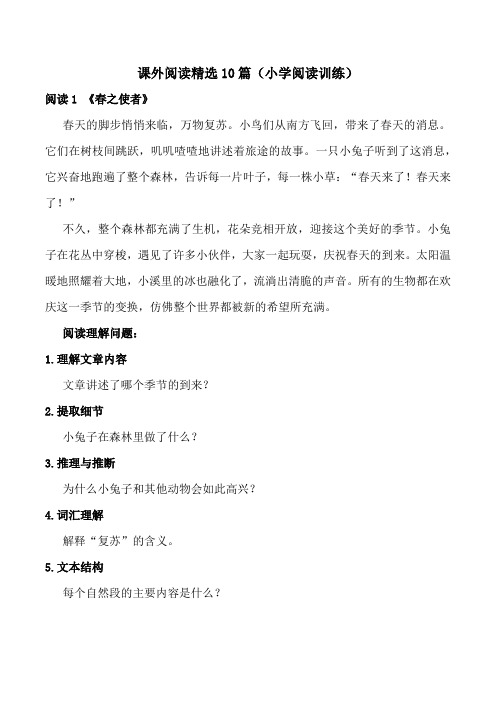
课外阅读精选10篇(小学阅读训练)阅读1 《春之使者》春天的脚步悄悄来临,万物复苏。
小鸟们从南方飞回,带来了春天的消息。
它们在树枝间跳跃,叽叽喳喳地讲述着旅途的故事。
一只小兔子听到了这消息,它兴奋地跑遍了整个森林,告诉每一片叶子,每一株小草:“春天来了!春天来了!”不久,整个森林都充满了生机,花朵竞相开放,迎接这个美好的季节。
小兔子在花丛中穿梭,遇见了许多小伙伴,大家一起玩耍,庆祝春天的到来。
太阳温暖地照耀着大地,小溪里的冰也融化了,流淌出清脆的声音。
所有的生物都在欢庆这一季节的变换,仿佛整个世界都被新的希望所充满。
阅读理解问题:1.理解文章内容文章讲述了哪个季节的到来?2.提取细节小兔子在森林里做了什么?3.推理与推断为什么小兔子和其他动物会如此高兴?4.词汇理解解释“复苏”的含义。
5.文本结构每个自然段的主要内容是什么?阅读2 《勇敢的小猫》夜晚,月亮高挂,星星闪烁。
小猫咪米米第一次独自外出探险。
它经过花园,遇到了好奇的青蛙和忙碌的夜蛾。
米米感到既兴奋又有点害怕,但它还是鼓起勇气继续前行。
突然,一阵风吹过,树叶沙沙作响,米米吓得躲进了一片草丛。
然而,当它看到一只萤火虫在空中缓缓飞行时,米米的恐惧消失了,它决定跟着萤火虫一起前进。
米米跟着萤火虫来到了一片空地,那里有许多小动物正在聚会,米米加入了它们,度过了一个难忘的夜晚。
阅读理解问题:1.理解文章内容米米在晚上做了什么?2.提取细节米米遇到了哪些动物?3.推理与推断米米为什么感到害怕?4.词汇理解“闪烁”在这里指的是什么?5.同义词识别找出与“勇敢”意思相近的词。
阅读3 《夏日的礼物》夏天,太阳高照,知了在树上唱歌。
小狗贝贝发现了一个大西瓜,它想要把这个惊喜送给它的朋友们。
于是它拉着西瓜,一路蹦蹦跳跳地去找小伙伴们分享这份夏日的甜蜜。
贝贝先去了小猫家,小猫高兴极了,邀请贝贝一起吃西瓜。
接着他们一起去邀请了小兔、小熊和小鹿。
大家围坐在一起,享受着清凉的西瓜,谈论着夏天的美好时光。
高三课外补充阅读素材
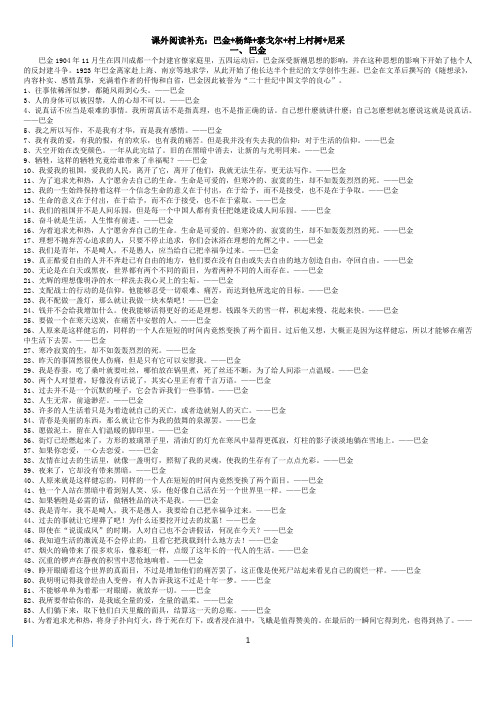
课外阅读补充:巴金+杨绛+泰戈尔+村上村树+尼采一、巴金巴金1904年11月生在四川成都一个封建官僚家庭里,五四运动后,巴金深受新潮思想的影响,并在这种思想的影响下开始了他个人的反封建斗争。
1923年巴金离家赴上海、南京等地求学,从此开始了他长达半个世纪的文学创作生涯。
巴金在文革后撰写的《随想录》,内容朴实、感情真挚,充满着作者的忏悔和自省,巴金因此被誉为“二十世纪中国文学的良心”。
1、往事依稀浑似梦,都随风雨到心头。
——巴金3、人的身体可以被囚禁,人的心却不可以。
——巴金4、说真话不应当是艰难的事情。
我所谓真话不是指真理,也不是指正确的话。
自己想什麽就讲什麽;自己怎麽想就怎麽说这就是说真话。
——巴金5、我之所以写作,不是我有才华,而是我有感情。
——巴金7、我有我的爱,有我的恨,有的欢乐,也有我的痛苦。
但是我并没有失去我的信仰:对于生活的信仰。
——巴金8、天空开始在改变颜色。
一年从此完结了。
旧的在黑暗中消去,让新的与光明同来。
——巴金9、牺牲,这样的牺牲究竟给谁带来了幸福呢?——巴金10、我爱我的祖国,爱我的人民,离开了它,离开了他们,我就无法生存,更无法写作。
——巴金11、为了追求光和热,人宁愿舍去自己的生命。
生命是可爱的,但寒冷的、寂寞的生,却不如轰轰烈烈的死。
——巴金12、我的一生始终保持着这样一个信念生命的意义在于付出,在于给予,而不是接受,也不是在于争取。
——巴金13、生命的意义在于付出,在于给予,而不在于接受,也不在于索取。
——巴金14、我们的祖国并不是人间乐园,但是每一个中国人都有责任把她建设成人间乐园。
——巴金15、奋斗就是生活,人生惟有前进。
——巴金16、为着追求光和热,人宁愿舍弃自己的生命。
生命是可爱的。
但寒冷的、寂寞的生,却不如轰轰烈烈的死。
——巴金17、理想不抛弃苦心追求的人,只要不停止追求,你们会沐浴在理想的光辉之中。
——巴金18、我们是青年,不是畸人,不是愚人,应当给自己把幸福争过来。
六年级上期课内补充阅读1

1、毛泽东热心帮助别人毛泽东长到七、八岁的时候,和10岁的孩子差不多高大了,虽然有些单薄,但粗手大脚,显得浑身都是力气。
毛泽东有他父亲那样的好体格,但他那圆圆的脸庞、宽阔的前额和充满智慧的眼睛,却很像母亲。
毛泽东的母亲是一位德行很好的农家妇女。
她勤俭、聪慧,性情温和,为人厚道,长慷慨地周济别人,尤其热心帮助穷苦人。
每逢荒年旱月,过年过节,她常常瞒着丈夫送些粮米给穷苦的乡亲们。
乡邻亲友无不称赞她的助人美德,她的贤良在韶山远近闻名的。
在母亲的熏陶下,毛泽东在少年时代就乐于帮助别人。
至今,在韶山还流传着学多他当年关心和帮助别人的故事。
毛泽东放学回家,忽然向母亲提出让他把中午饭到带到学校里去吃,母亲感到很奇怪,就问:“你带饭做什么?这么近,你还怕迟到吗?”毛泽东解释说:“中午带饭当然好些,一放下饭碗就读书写字,不会耽误工夫。
”母亲对这种做法还有点怀疑,父亲却在一旁听到了,他对儿子这样发奋读书,感到十分高兴,马上表示赞成。
后来,他又补充一句说::“记着!我们莫和那些人家比阔气,不要带什么荤菜,只带点酸菜子,再加点辣椒就是。
”母亲照办了,不过,她十分疼爱儿子,有时还是瞒着丈夫,偷偷地把一点火焙鱼或几条辣泥鳅在米饭下面,好让儿子吃得好一点,儿子已经是半个大人了,很快就要成为有学问的人了。
可是从这一天起,母亲发现一个奇怪的现象:每次放学回来,饭篮子里一粒米也没有剩,而到吃晚饭时,毛泽东却吃得特别多,暗想:带去的饭不少啊,怎会饿成这个样子?后来又一转念:对了,儿子正是长身体的时候,是要多吃一些了。
于是,从第二天起,换了一个大碗,还多带了半碗酸菜。
第二天,吃晚饭时,母亲格外细心地观察儿子的变化,只见毛泽东饿得更厉害了,那又粗又硬的糙米饭,几筷就扒掉一大碗。
一看这情景。
母亲更怀疑了,也更焦急了,她担心儿子得了什么病,就不安地问:“孩子,你怎么这样饿?是不是不舒服?”毛泽东望着母亲的眼睛,记起了母亲常讲的话:“要做一个老实人,莫讲假话。
课外补充阅读练习2
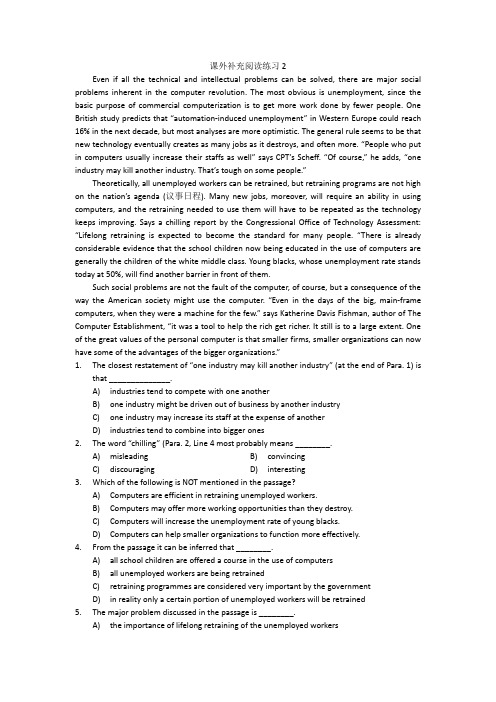
课外补充阅读练习2Even if all the technical and intellectual problems can be solved, there are major social problems inherent in the computer revolution. The most obvious is unemployment, since the basic purpose of commercial computerization is to get more work done by fewer people. One British study predicts that “automation-induced unemployment” in Western Europe could reach 16% in the next decade, but most analyses are more optimistic. The general rule seems to be that new technology eventually creates as many jobs as it destroys, and often more. “People who put in computers usually increase their staffs as well” says CPT’s Scheff. “Of course,” he adds,“one industry may kill another industry. Tha t’s tough on some people.”Theoretically, all unemployed workers can be retrained, but retraining programs are not high on the nation’s agenda (议事日程). Many new jobs, moreover, will require an ability in using computers, and the retraining needed to use them will have to be repeated as the technology keeps improving. Says a chilling report by the Congressional Office of Technology Assessment: “Lifelong retraining is expected to become the standard for many people. “There is already considerable evidence that the school children now being educated in the use of computers are generally the children of the white middle class. Young blacks, whose unemployment rate stands today at 50%, will find another barrier in front of them.Such social problems are not the fault of the computer, of course, but a consequence of the way the American society might use the computer. “Even in the days of the big, main-frame computers, when they were a machine for the few.” says Katherine Davis Fishman, author of The Computer Establ ishment, “it was a tool to help the rich get richer. It still is to a large extent. One of the great values of the personal computer is that smaller firms, smaller organizations can now have some of the advantages of the bigger organizations.”1. The close st restatement of “one industry may kill another industry” (at the end of Para. 1) isthat ______________.A) industries tend to compete with one anotherB) one industry might be driven out of business by another industryC) one industry may increase its staff at the expense of anotherD) industries tend to combine into bigger ones2. The word “chilling” (Para. 2, Line 4 most probably means ________.A) misleading B) convincingC) discouraging D) interesting3. Which of the following is NOT mentioned in the passage?A) Computers are efficient in retraining unemployed workers.B) Computers may offer more working opportunities than they destroy.C) Computers will increase the unemployment rate of young blacks.D) Computers can help smaller organizations to function more effectively.4. From the passage it can be inferred that ________.A) all school children are offered a course in the use of computersB) all unemployed workers are being retrainedC) retraining programmes are considered very important by the governmentD) in reality only a certain portion of unemployed workers will be retrained5. The major problem discussed in the passage is ________.A) the importance of lifelong retraining of the unemployed workersB) the social consequences of the widespread use of computers in the United StatesC) the barrier to the employment of young peopleD) the general rule of the advancement of technology。
部编版三年级语文上册 期中课外阅读拓展专项(含答案)

部编版三年级语文上册期中课外阅读拓展专项范围:第1-4 单元时间:40 分钟满分:100 分班级:姓名:得分:.一、阅读短文,完成练习。
秋的原野①窗外飘进来一片梧桐的落叶。
我对它凝视了一会儿,忧然领悟到:这是大自然给人们的讯号,秋天已经来临了。
②我勿勿地走到郊外,在原野中漫步游荡,享受着徐徐吹来的凉风,感到浑身有种说不出的舒畅。
我贪(lán)地吸了几口新鲜空气,又不由自主地哼出一支轻快的小调。
③天空像,它已经被秋风抹拭得非常洁净而明亮。
村外的那个小塘,也着碧澄澄的眼睛,凝望着这美好的天色。
那塘边开满白花的芦苇丛里,忽然钻出一对白鹅,慢吞吞地在水面浮游着。
它俩显得天真烂漫,或许嫌这儿过于寂窦吧,于是伸长颈项,“哦! 哦!”有节奏地叫着,水面荡起一圈圈的波纹,为大自然平添了不少生气。
④山谷里枫树的叶子,或许是喝了过量的酒,或许是为了向秋天表达它们无限的热情,不然,它们为什么红得像似的呢?⑤村前村后,等待着收割的稻田,好似。
一阵微风吹过,泛起了一排排金色的波浪。
稻田深处,不时传来一阵阵农民的欢笑声。
⑥当七彩的晚霞在天边编成瑰(guī)丽的织锦时,村里屋顶的烟上也升起了的坎烟,跨上牛背回家的牧童们,唱着抒情的歌谣,歌声在晚风里飘得很远,很远......1.阅读短文,理解词语的意思。
(4 分)(1)“我对它凝视了一会儿,忧然领悟到”一句中,作者“凝视了一会儿”才明白秋天来临了,由此可知“忧然”的意思是。
(2 分)(2)读到“我贪地吸了几口新鲜空气”时,通过想象画面,我知道“贪”的意思是()。
(2 分)A.贪图快乐B.贪得无厌C.渴求而不知满足2.联系上下文,选择恰当的短语填到文中的横线上。
(3 分)A.一片金黄色的大海B.一团火焰C.一颗覆盖大地的蓝宝石3.第③段描写的景物有、、、。
(4 分)4.秋天的原野像一幅幅图画,请结合短文内容,连一连。
(2 分)第③段牧童晚归图第④段稻田丰收图第⑤段枫林红叶图第⑥段池塘秋色图5. 短文表达了作者对的喜爱与赞美之情。
七年级上册英语补充课外阅读(1)

七年级英语课外阅读(一)Hello, everyone! My name is Jane. Today I want to talk about our school. Our school isn’t big but it is beautiful. There is a classroom building near the school gate. The classrooms, the music rooms, the teachers’ offices are all in it. The playground is behind the classroom building. We often play basketball after class. Our library is on the left of the dining hall and it is behind the playground. The food in dining hall is nice. I like our school because it is like our home.Hello, everyone. My name is Johnson. I’m a middle school student. I am a soccer fan . I play soccer after school every day. My father is a soccer fan, too. He plays soccer very well. I like playing soccer with my father very much. We have a great collection of fifteen soccer balls. But my mother and my sister don’t like soccer. They only watch TV at home. They say many TV programs are very interesting.Jonas is a lovely boy. He likes sports very much .He likes football, ping-pong and baseball .But he doesn’t like volleyball. He thinks it’s boring. He has a little sister .Her name is Lily .He likes her very much .On his desk there is a green clock, an interesting book and a pen .Every evening he reads the book there.Kate is from a family of three people.They like to eat different kinds of food.Kate likes noodles a lot.He likes to have noodles for every meal.But he doesn't like meat at all.Her father is from Tianjin.He doesn't like noodles at all.He likes rice very much.Her mother is from Dalian.She likes fish,vegetables and fruit very much,but she doesn't like rice or noodles.Dear Alan,It’s Monday, July 15. I’m really busy today. At 8: 00, I have Chinese.I don’t like Chinese. It’s boring. Then at 9: 00 I have maths. I like it very much because it’s very interesting. Next, at 10: 00, I have English. It’s my favourite subject. At 11: 00, I have music. I like it because it’s relaxing. I have lunch at 12: 25. After lunch, I have science. It’s fun. Then I have PE.I like it. It’s exciting. We can play football. After PE, we have history. It’s fun. Then I go home at 5: 00.Yours,AmyTina and Lisa are middle school students. They want to go shopping. And they don’t have classes on Sunday . So they go to the store. It is a very nice store. They can buy a lot of things there. Tina buys a pen and Lisa buys a pencil case. In the store, there is also food. Tina buys some apples and bananas. Lisa buys some tomatoes and carrots for her mother. They are very happy to go back home with their things.。
课外阅读10篇(小学阅读训练)

课外阅读10篇(小学阅读训练)阅读1 《四季之美》四季轮回,各有其独特的美。
春天,万物复苏,嫩绿的叶片从枝头探出头来,仿佛是大自然的新生。
小草从泥土中钻出,伸展着嫩绿的身体,花朵竞相绽放,散发出淡淡的香气。
春天的气息充满了希望和活力,它唤醒了沉睡的大地,让人们感受到生命的蓬勃。
夏天,烈日炎炎,蝉鸣声此起彼伏,仿佛是大自然的热情宣言。
人们在树荫下乘凉,孩子们在水中嬉戏,夏天的阳光和热情让人心情愉悦。
秋天,金黄的稻田随风起伏,落叶纷飞,仿佛是大自然的成熟与丰收。
农民伯伯收割稻谷,果园里硕果累累,秋天是收获的季节,也是感恩的季节。
冬天,白雪皑皑,银装素裹,仿佛是大自然的沉睡与静谧。
孩子们堆雪人、打雪仗,冬日的寒冷也被欢乐驱散。
每个季节都有它独有的色彩与韵味,让人感受到生命的脉动与自然的魅力。
在这四季更迭中,我们不仅看到了大自然的变化,更体验到了生活的丰富多彩。
阅读理解问题:1. 理解文章内容四季分别代表了什么?2. 提取细节春天和冬天的景色有何特点?3. 推理与推断作者通过四季的描绘表达了什么情感?4. 词汇理解“复苏”在此处的含义是什么?5. 同义词识别找出与“丰富多彩”意思相近的词。
阅读2 《母爱》(情感文)母爱是一种无法言喻的力量,它如同温暖的阳光,无论何时何地都能给予我们最深的慰藉。
当我们遇到困难时,母亲总是第一个伸出援手的人;当我们感到孤独时,母亲的怀抱是最温暖的港湾。
母爱不仅是无私的付出,更是无条件的理解和支持。
在成长的路上,母爱是我们最坚实的依靠,也是我们心中永恒的灯塔。
无论我们走到哪里,无论我们遇到什么样的挑战,母亲的爱永远伴随着我们,给我们力量和勇气去面对一切。
这种爱是无私的,是永恒的,它教会我们如何去爱,如何去珍惜身边的每一个人。
阅读理解问题:1. 理解文章内容母爱的特点是什么?2. 提取细节母亲在我们遇到困难时会怎么做?3. 推理与推断为什么说母爱是永恒的灯塔?4. 词汇理解“港湾”在此处的比喻意义是什么?5. 同义词识别找出与“依靠”意思相近的词。
课外补充阅读练习
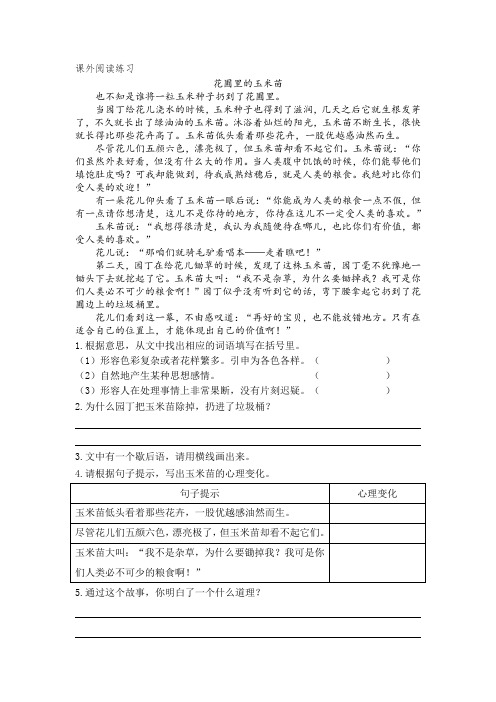
课外阅读练习花圃里的玉米苗也不知是谁将一粒玉米种子扔到了花圃里。
当园丁给花儿浇水的时候,玉米种子也得到了滋润,几天之后它就生根发芽了,不久就长出了绿油油的玉米苗。
沐浴着灿烂的阳光,玉米苗不断生长,很快就长得比那些花卉高了。
玉米苗低头看着那些花卉,一股优越感油然而生。
尽管花儿们五颜六色,漂亮极了,但玉米苗却看不起它们。
玉米苗说:“你们虽然外表好看,但没有什么大的作用。
当人类腹中饥饿的时候,你们能帮他们填饱肚皮吗?可我却能做到,待我成熟结穗后,就是人类的粮食。
我绝对比你们受人类的欢迎!”有一朵花儿仰头看了玉米苗一眼后说:“你能成为人类的粮食一点不假,但有一点请你想清楚,这儿不是你待的地方,你待在这儿不一定受人类的喜欢。
”玉米苗说:“我想得很清楚,我认为我随便待在哪儿,也比你们有价值,都受人类的喜欢。
”花儿说:“那咱们就骑毛驴看唱本——走着瞧吧!”第二天,园丁在给花儿锄草的时候,发现了这株玉米苗,园丁毫不犹豫地一锄头下去就挖起了它。
玉米苗大叫:“我不是杂草,为什么要锄掉我?我可是你们人类必不可少的粮食啊!”园丁似乎没有听到它的话,弯下腰拿起它扔到了花圃边上的垃圾桶里。
花儿们看到这一幕,不由感叹道:“再好的宝贝,也不能放错地方。
只有在适合自己的位置上,才能体现出自己的价值啊!”1.根据意思,从文中找出相应的词语填写在括号里。
(1)形容色彩复杂或者花样繁多。
引申为各色各样。
()(2)自然地产生某种思想感情。
()(3)形容人在处理事情上非常果断,没有片刻迟疑。
()2.为什么园丁把玉米苗除掉,扔进了垃圾桶?3.文中有一个歇后语,请用横线画出来。
4.请根据句子提示,写出玉米苗的心理变化。
5.通过这个故事,你明白了一个什么道理?。
八年级上册课外补充(一).doc

有什么好准 你小时候就 跑着,一脚 她又悄悄地 一、阅读精选:《秋天的怀念》 (史铁生)双腿瘫痪以后,我的脾气变得暴怒无常。
望着天上北归的雁阵,我会突然把我面前的玻 璃砸碎;听着听着李谷一甜美的歌声,我会猛地把手边的东西摔向四周的墙壁。
母亲悄悄地 躲出去,在我看不见的地方偷偷地听着我的动静。
当一切恢复沉寂,她又悄悄地进来,眼边 红红的,看着我。
“听说北海的花都开了,我推着你去走走。
”她总是这么说,母亲喜欢花, 可自从我的腿瘫痪后,她侍弄的那些花都死了。
“不,我不去!”我狠命地锤打这两条可怕的 腿。
喊着:“我活着有什么劲! ”母亲扑过来抓住我的手,忍住哭声说:“咱娘儿俩在一块儿, 好好儿活,好好儿活……”可我却一直都不知道,她的病已经到了那步田地,后来妹妹告诉我,她常常肝疼得整宿 整宿翻来覆去睡不了觉。
那天我又独自在屋里,看着窗外的树叶“制制啦啦”地飘落。
母亲进来了,挡在窗前: “北海的菊花开了,我推着你去看看吧。
”她憔悴的脸上现出央求般的神色。
“什么时候? ”“你要是愿意,就明天?”她说,我的回答已经让她喜出望外了。
“好吧,就明天。
”我说。
她高 兴得一会儿坐下,一会儿站起:“那就赶紧准备准备。
”“哎呀,烦不烦?几步路, 备的! ”她也笑了,坐在我身边,絮絮叨叨地说:“看完菊花,咱们就去'仿膳', 爱吃那儿的豌豆黄儿。
还记得那回我带你去北海吗?你偏说那杨树花是毛毛虫, 踩一个……”她忽然不说了。
对于“跑”和“踩” 一类的字儿,她比我还敏感。
出去了。
她出去了,就再也没回来。
领导们把她抬上车时,她还在大口大口地吐着鲜血。
我没想她已经病成那样,看着三轮 车远去,也决没想到那竟是永远的诀别。
邻居家的小伙子背着我去看她的时候,她正艰难地呼吸着,像她那一生艰难的生活。
别 人告诉我,她昏迷前的最后一句话是:“我那个有病的儿子和那个还未成年的女儿……”又是秋天,妹妹推我去北海看菊花。
黄色的花淡雅,白色的花高洁,紫红色的花热烈而 深沉,泼泼洒洒,秋风中正开得烂漫。
5年级语文补充习题答案

5年级语文补充习题答案五年级语文补充习题答案【阅读理解】1. 阅读短文《春》,回答问题:- 短文主要描绘了春天的哪些景象?答:短文描绘了春天的景象包括:嫩绿的柳条、温暖的阳光、解冻的河流、欢快的小鸟、五彩斑斓的花朵以及孩子们的笑脸。
- 作者通过春天的景象表达了什么样的情感?答:作者通过春天的景象表达了对春天的喜爱和对生命活力的赞美。
2. 阅读短文《秋天的收获》,回答问题:- 短文中提到了哪些秋天的收获?答:短文中提到了秋天的收获包括:金黄的稻谷、成熟的水果、丰收的蔬菜以及农民脸上的喜悦。
- 短文是如何描述农民的劳动的?答:短文通过描述农民辛勤的劳作、汗水的滴落以及丰收时的满足感,展现了农民对劳动的热爱和对成果的自豪。
【词语运用】1. 根据上下文,选择正确的词语填空:- 他()了一大杯水,然后()地离开了。
答:他(喝)了一大杯水,然后(快步)地离开了。
2. 根据句子的意思,选择正确的词语填空:- 老师()地走进了教室,同学们立刻安静下来。
答:老师(轻声)地走进了教室,同学们立刻安静下来。
【句子理解】1. 请解释句子“山重水复疑无路,柳暗花明又一村”的意思。
答:这句话比喻在困难重重、前途渺茫的情况下,忽然出现了转机或希望。
2. 请解释句子“不以物喜,不以己悲”的意思。
答:这句话的意思是不因外界事物的好坏而感到高兴,也不因个人的得失而感到悲伤,表达了一种超脱物欲、宠辱不惊的人生态度。
【作文】题目:《我的家乡》要求:描述你的家乡,包括家乡的自然风光、文化特色、风土人情等。
我的家乡位于风景秀丽的江南水乡,那里有清澈的河流、翠绿的竹林和古老的石桥。
春天,田野里开满了金黄色的油菜花,空气中弥漫着淡淡的花香。
夏天,孩子们在河里游泳嬉戏,享受着清凉的河水。
秋天,稻田里一片金黄,农民伯伯脸上洋溢着丰收的喜悦。
冬天,虽然寒冷,但家家户户都会围坐在火炉旁,享受温暖的时光。
家乡的文化特色也十分鲜明,每年的春节、端午节和中秋节,我们都会举行丰富多彩的民俗活动,如舞龙、赛龙舟、吃粽子等。
一年级语文下册《课外阅读》拓展试题20篇,含答案,
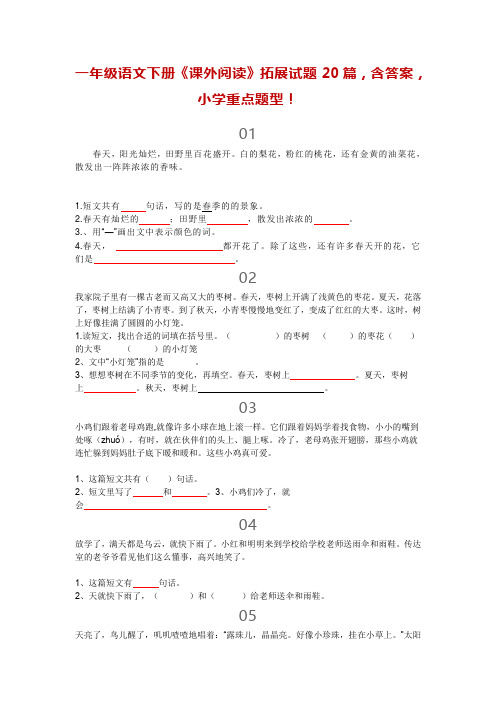
一年级语文下册《课外阅读》拓展试题20篇,含答案,小学重点题型!01春天,阳光灿烂,田野里百花盛开。
白的梨花,粉红的桃花,还有金黄的油菜花,散发出一阵阵浓浓的香味。
2.春天有灿烂的;田野里,散发出浓浓的。
3.、用“—”画出文中表示颜色的词。
4.春天,都开花了。
除了这些,还有许多春天开的花,它们是。
02我家院子里有一棵古老而又高又大的枣树。
春天,枣树上开满了浅黄色的枣花。
夏天,花落了,枣树上结满了小青枣。
到了秋天,小青枣慢慢地变红了,变成了红红的大枣。
这时,树上好像挂满了圆圆的小灯笼。
1.读短文,找出合适的词填在括号里。
()的枣树()的枣花()的大枣()的小灯笼2、文中“小灯笼”指的是。
3、想想枣树在不同季节的变化,再填空。
春天,枣树上。
夏天,枣树上。
秋天,枣树上小鸡们跟着老母鸡跑,就像许多小球在地上滚一样。
它们跟着妈妈学着找食物,小小的嘴到处啄(zhuó),有时,就在伙伴们的头上、腿上啄。
冷了,老母鸡张开翅膀,那些小鸡就连忙躲到妈妈肚子底下暖和暖和。
这些小鸡真可爱。
1、这篇短文共有()句话。
2、短文里写了和。
3、小鸡们冷了,就会。
04放学了,满天都是乌云,就快下雨了。
小红和明明来到学校给学校老师送雨伞和雨鞋。
传达室的老爷爷看见他们这么懂事,高兴地笑了。
1、这篇短文有句话。
2、天就快下雨了,()和()给老师送伞和雨鞋。
05天亮了,鸟儿醒了,叽叽喳喳地唱着:“露珠儿,晶晶亮。
好像小珍珠,挂在小草上。
”太阳听见了,说:“露珠是什么样?让我看看。
”太阳睁大眼睛对着小草使劲儿看,可是什么也没看见。
太阳呆住了,“咦,露珠儿呢,哪儿去了?”1、天亮了,()醒了,叽叽喳喳唱着歌。
2、露珠儿,晶晶亮,好像()挂在小草上。
3、露珠为什么不见了,是因为()A、太阳出来了。
B、露珠掉在地上了。
06冬姑娘来到公园。
她看到许多许多的人,有的在滑雪,有的在滑冰,有的在打雪仗、堆雪人,写诗画画、拍照留影。
他们都被美丽的风景迷住了。
课外补充阅读练习-英语阅读理解
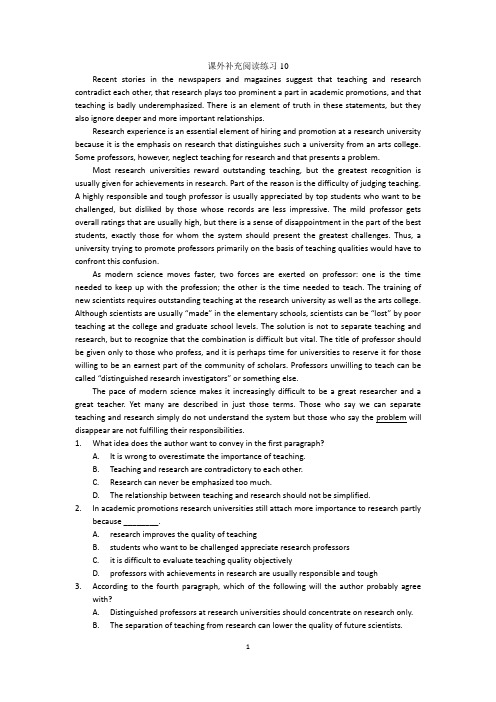
课外补充阅读练习10Recent stories in the newspapers and magazines suggest that teaching and research contradict each other, that research plays too prominent a part in academic promotions, and that teaching is badly underemphasized. There is an element of truth in these statements, but they also ignore deeper and more important relationships.Research experience is an essential element of hiring and promotion at a research university because it is the emphasis on research that distinguishes such a university from an arts college. Some professors, however, neglect teaching for research and that presents a problem.Most research universities reward outstanding teaching, but the greatest recognition is usually given for achievements in research. Part of the reason is the difficulty of judging teaching.A highly responsible and tough professor is usually appreciated by top students who want to be challenged, but disliked by those whose records are less impressive. The mild professor gets overall ratings that are usually high, but there is a sense of disappointment in the part of the best students, exactly those for whom the system should present the greatest challenges. Thus, a university trying to promote professors primarily on the basis of teaching qualities would have to confront this confusion.As modern science moves faster, two forces are exerted on professor: one is the time needed to keep up with the profession; the other is the time needed to teach. The training of new scientists requires outstanding teaching at the research university as well as the arts college. Although scientists are usually “made” in the elementary schools, scientists can be “lost” by poor teaching at the college and graduate school levels. The solution is not to separate teaching and research, but to recognize that the combination is difficult but vital. The title of professor should be given only to those who profess, and it is perhaps time for universities to reserve it for those willing to be an earnest part of the community of scholars. Professors unwilling to teach can be called “distinguished research investigators” or something else.The pace of modern science makes it increasingly difficult to be a great researcher and a great teacher. Yet many are described in just those terms. Those who say we can separate teaching and research simply do not understand the system but those who say the problem will disappear are not fulfilling their responsibilities.1. What idea does the author want to convey in the first paragraph?A. It is wrong to overestimate the importance of teaching.B. Teaching and research are contradictory to each other.C. Research can never be emphasized too much.D. The relationship between teaching and research should not be simplified.2. In academic promotions research universities still attach more importance to research partlybecause ________.A. research improves the quality of teachingB. students who want to be challenged appreciate research professorsC. it is difficult to evaluate teaching quality objectivelyD. professors with achievements in research are usually responsible and tough3. According to the fourth paragraph, which of the following will the author probably agreewith?A. Distinguished professors at research universities should concentrate on research only.B. The separation of teaching from research can lower the quality of future scientists.C. It is of utmost importance to improve teaching in elementary schools in order to trainnew scientists.D. The rapid developments of modern science make it impossible to combine teachingwith research.4 The title of professor should be given only to those who, first and foremost, do ________.A. teachingB. field workC. scientific researchD. investigation5. The phrase “the problem” (Para. 5, Line 3) refers to ________.A. raising the status of teachingB. the combination of teaching with researchC. the separations of teaching from researchD. improving the status of research。
Fog课外阅读课补充文本材料

FogFog warningWhen Polly left home that morning, the city was already covered in a grey mist. At lunch, the radio forecast that the mist would become a thick fog in the afternoon. At four o’clock, Polly left work and stepped out into the fog. She wondered if the buses would still be running. No buses to King StreetOnce out in the street, she walked quickly towards her usual bus stop. ‘How far are you going?’ the bus conductor asked her before he took her fare. ‘King Street,’ said Polly. ‘Sorry, Miss,’ replied the man, ‘the truth is that it is too foggy for the bus to run that far. Take the Underground to Green Park. The weather might be better there and you might be able to get a taxi.’A tall manAs Polly observed the passengers on the train, she had a feeling that she was being watched by a tall man in a dark overcoat. At last the train arrived at Green Park station. While the rest of the passengers were getting out, she glanced at the faces around her. The tall man was nowhere to be seen.FootstepsWhen Polly got to the station entrance, it was empty. Outside, wherever she looked the fog lay like a thick, grey cloud. There was no one in sight. Polly set off towards Park Street. As she walked along the narrow street, she heard the sound of footsteps approaching, but by the time she reached the corner of the street, the footsteps were gone. Suddenly Polly felt a rough hand brush her cheek, and she heard a man’s voice in her ear saying ‘Sorry.’ The man moved away. She could feel her heart beating with fear.The _________ strangerThen she heard the sound again—soft footsteps behind her. A minute before, she had wished for someone to come along. Now she wanted to run, but fear held her still. The footsteps seemed close now. Then a man’s voice came out of the darkness. ‘Is anybody there?’Polly hesitated. At last she answered, ‘Hello, I think I’m lost.’A few seconds later, a hand reached out and grasped her arm. Polly found herself staring up at the face of an old man with a beard. ‘Maybe I can help you. Which road do you want?’ he asked.‘I live at 86 King Street,’ Polly replied.‘Just take my hand,’ said the man. ‘Come with me. You’ll be all right.’ He took Polly’s hand. ‘Watch out for the step here.’In his other hand the man carried a stick. Polly heard it hit the step. ‘I can remember some terrible fogs, but maybe that was before your time. I can’t see your face, but you sound young. How old are you?’‘Just twenty,’ answered Polly. ‘Ah, twenty! A nice age to be. I was young once. Now we’re at the crossroads. Turn left here.’‘I’m quite lost now. Are you sure you know the way?’ Polly was beginning to feel frightened again. ‘Of course. You really shouldn’t feel anxious.’ He held her hand more firmly.。
五年级部编版语文上学期课外阅读理解培优补差专项

五年级部编版语文上学期课外阅读理解培优补差专项班级:_____________ 姓名:_____________课外阅读理解1. 课外阅读。
芭蕉芭蕉是一种多年生草本植物,芭蕉的茎高达三四米,不分枝,丛生。
芭蕉叶大,呈椭圆形,有粗大的主脉,两侧具有平行脉。
芭蕉叶的表面呈深绿色,有着对称而又细密、匀称的纹路,光滑得如同打了一层蜡,叶背呈浅绿色,略有粗糙感。
入夏,芭蕉的叶丛中便会抽出淡黄色的大花。
芭蕉的生命力很强。
我们学校的一角就有几棵芭蕉,它们虽然饱经霜打雨淋、风吹日晒的折磨,却依旧是那么春意盎然、生机勃勃,像健美的绿衣少女,在校园中形成了一道独特的风景。
自古以来,芭蕉就以孤独忧愁的形象出现在文人的笔下。
著名女词人李清照曾写过:“窗前谁种芭蕉树,阴满中庭。
阴满中庭,叶叶心心,舒卷有余清。
”她借芭蕉这一意象,把伤心、愁闷一股脑儿倾诉了出来。
芭蕉还有一定的药用价值。
芭蕉根捣烂涂抹患处,对消除肿毒有很好的疗效。
芭蕉的用途可真大呀!我欣赏芭蕉那颀长秀美的身姿,欣赏它那素淡可爱的黄花,更佩服它那种昂扬向上、不畏风雨的精神!(有删改) 1.根据意思,从文中找出合适的词语写在括号里。
(1)春天的意味正浓。
(________)(2)形容生命力旺盛的样子。
(________)2.用“____”画出文中的一个比喻句,再仿写一句。
___________________________________________3.这篇短文主要从_________、___________、_________、_______几个方面来介绍芭蕉。
4.为了强化读者对芭蕉的认识,作者还引用了著名女词人__________的词句,使全文显得内容丰富。
5.作者为什么会欣赏芭蕉?文章的最后一段有什么作用?_______________________________________6.芭蕉成为古人笔下咏诵的对象,你还知道哪种植物也曾经成为古人的情感寄托?请写出两句与它相关的诗句跟大家分享吧!___________________________________________2. 课外阅读。
北师大版五年级上册语文课外阅读理解培优补差专项
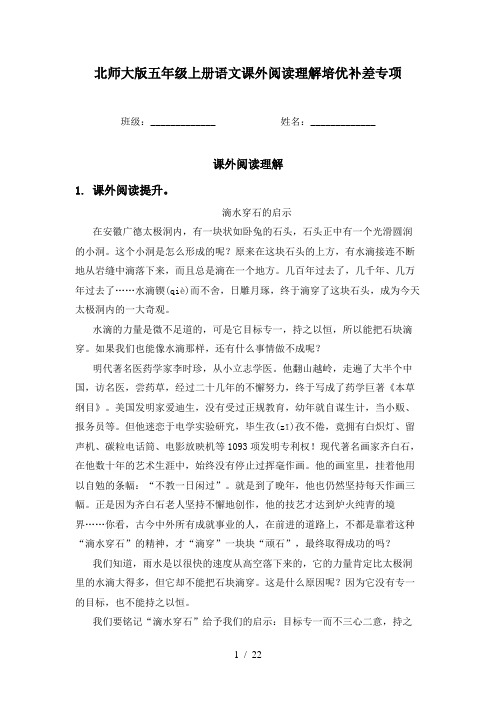
北师大版五年级上册语文课外阅读理解培优补差专项班级:_____________ 姓名:_____________课外阅读理解1. 课外阅读提升。
滴水穿石的启示在安徽广德太极洞内,有一块状如卧兔的石头,石头正中有一个光滑圆润的小洞。
这个小洞是怎么形成的呢?原来在这块石头的上方,有水滴接连不断地从岩缝中滴落下来,而且总是滴在一个地方。
几百年过去了,几千年、几万年过去了……水滴锲(qiè)而不舍,日雕月琢,终于滴穿了这块石头,成为今天太极洞内的一大奇观。
水滴的力量是微不足道的,可是它目标专一,持之以恒,所以能把石块滴穿。
如果我们也能像水滴那样,还有什么事情做不成呢?明代著名医药学家李时珍,从小立志学医。
他翻山越岭,走遍了大半个中国,访名医,尝药草,经过二十几年的不懈努力,终于写成了药学巨著《本草纲目》。
美国发明家爱迪生,没有受过正规教育,幼年就自谋生计,当小贩、报务员等。
但他迷恋于电学实验研究,毕生孜(zī)孜不倦,竟拥有白炽灯、留声机、碳粒电话筒、电影放映机等1093项发明专利权!现代著名画家齐白石,在他数十年的艺术生涯中,始终没有停止过挥毫作画。
他的画室里,挂着他用以自勉的条幅:“不教一日闲过”。
就是到了晚年,他也仍然坚持每天作画三幅。
正是因为齐白石老人坚持不懈地创作,他的技艺才达到炉火纯青的境界……你看,古今中外所有成就事业的人,在前进的道路上,不都是靠着这种“滴水穿石”的精神,才“滴穿”一块块“顽石”,最终取得成功的吗?我们知道,雨水是以很快的速度从高空落下来的,它的力量肯定比太极洞里的水滴大得多,但它却不能把石块滴穿。
这是什么原因呢?因为它没有专一的目标,也不能持之以恒。
我们要铭记“滴水穿石”给予我们的启示:目标专一而不三心二意,持之以恒而不半途而废,就一定能够实现我们美好的理想。
1.联系上文说说下列词语的意思。
微不足道: ________________________孜孜不倦:__________________________2.根据短文内容填空。
语文人教版四年级下册补充阅读

苏秦刺股苦学古时候,有一个学者叫苏秦。
苏秦自幼家境贫寒,连书都读不起。
为了维持生计和读书,他不得不时常卖自己的头发或者帮别人打短工,后来又离乡背景到了齐国拜师学艺。
经过一年的学习,苏秦认为自己已经把老师的本领都学到了,便迫不急待告别老师和同学,去闯荡天下。
但是一年后不仅一无所获,连钱也用完了。
他只能穿着破衣草鞋踏上了回家之路。
到家时,苏秦已骨瘦如柴,全身破烂肮脏不堪,满脸尘土。
妻子见他这个样子,摇头叹息,继续织布;嫂子见他这副样子扭头就走,不愿做饭;父母,兄弟,妹妹不但不理他,还暗暗笑他活该!他认识到了自己的不足,又重新振作精神,搬出所有的书本,发愤读书。
他每天读书到深夜,有时候不知不觉伏在书案上就睡着了。
第二天醒来,都后悔不已,但又没有什么办法不让自己睡着。
有一天,读着读着实在困了,不由自主便扑倒在书案上,但他猛然惊醒——手臂被什么东西刺了一下。
一看是书案上放着一把锥子,他马上想出了制止打瞌睡的办法:锥刺股(大腿)!以后每当要打瞌睡时,就用锥子扎自己的大腿一下,让自己突然“痛醒”。
他的大腿因此常常是鲜血淋淋,目不忍赌。
家人见到这样,有些不忍心,劝他说:“你一定要成功的决心和心情我们可以理解,但不一定非要这样虐待自己啊!”苏秦回答说:“不这样,就会忘记过去的耻辱!”经过“血淋淋”的一年,苏秦已经很有学问了。
他又开始出去闯荡天下,这一次终于事业有成,很有心得,开创了自己辉煌的政治生涯。
原文:苏秦乃洛阳人,学纵横之术,游说秦王,书十上而不为用,资用匮乏,潦倒而归。
至家,妻不下紝,嫂不为炊,父母不以为子。
苏秦乃叹曰:“此皆秦之罪也!”乃发奋读书,曰:“安有说人主而不得者乎?”读书欲睡,引锥自刺其股,血流至足。
后卒合齐、楚、燕、赵、魏、韩抗秦,佩六国相印。
祖冲之计算圆周率我国大数学家祖冲之不但精通天文、历法,他在数学方面的贡献,特别对“圆周率”研究的杰出成就,更是超越前代。
大家知道圆周率π是圆周与直径之比π≈3.14159。
七年级语文课外阅读理解练习含答案

七年级语文课外阅读理解练习含答案人人都知道读书对于学生来说非常重要,但是平时学生们都忙于完成老师布置的大量作业和背诵课文,很少有时间进行课外阅读。
然而,七年级是学生们开始接触中学阶段的开始,这个时候适合培养学生们的阅读兴趣和阅读能力。
为了帮助学生们提高阅读水平,提供一些七年级的语文课外阅读理解练习题目,希望对学生们有所帮助。
第一篇:《小狗与老虎》从前有一只小狗,他一直生活在森林里。
他非常友善,经常去寻找其他动物玩耍。
他最好的朋友是一只大老虎,他们经常一起玩耍,一起寻找美食。
小狗和老虎之间建立了深厚的友谊,并且相互帮助。
有一天,小狗遇到了一只小兔子,小兔子告诉小狗,老虎是食肉动物,他们不应该成为朋友,因为老虎可能会吃掉小狗。
但是小狗并不相信,他知道老虎是一只很好的动物,他决定继续和老虎做朋友。
不久之后,小狗和老虎在森林里遇到了一只大狼。
大狼对小狗和老虎非常凶狠,想要吃掉他们。
小狗马上跑到老虎身边,说:“老虎是我的朋友,你不可以伤害他!”听到这里,大狼吓得逃跑了。
从那以后,小狗和老虎的友谊更加深厚了。
他们经历了许多冒险,但是永远相互支持和保护对方。
他们不在乎别人怎么看待他们之间的关系,只关心彼此的友谊。
请回答以下问题:1. 故事中的小狗和老虎之间的关系如何?2. 为什么小兔子认为小狗和老虎不应该成为朋友?3. 故事中的大狼想要做什么?4. 小狗是怎么保护老虎的?5. 故事中的主题是什么?参考答案:1. 故事中的小狗和老虎是非常好的朋友,他们互相帮助和支持对方。
2. 小兔子认为小狗和老虎不应该成为朋友,因为老虎是食肉动物,他们可能会吃掉小狗。
3. 故事中的大狼想要吃掉小狗和老虎。
4. 小狗保护老虎的方法是跑到老虎身边,告诉大狼他们是朋友,不可以伤害老虎。
5. 故事的主题是真正的朋友永远支持和保护对方。
三年级课外补充阅读题1(含答案)(可编辑修改word版)

三年级阅读训练一、我的家乡有一个美丽的湖,名叫天鹅湖。
据说许多年以前,曾经有一群天鹅在这里生活,因此而得名。
湖呈圆形,湖水清可见底,碧得发亮。
湖的四周有茂密的树木。
其中最引人注目的是垂(cuíchuí )柳,在微风的吹动下,柳条迎(yíng yín )风起舞。
湖水映衬出柳姑娘的身影十分秀美。
树下是一片嫩绿(lǜlù)的草地,草地上开着红的、黄的、蓝的小花。
湖上有一座美丽的小桥,把天鹅湖打扮得更加美丽。
1、给短文加个题目:(3 分)2、保留()里正确的读音,划去不正确的。
(3 分)3、第2 自然段先写了湖水()、(),再写湖的四周有(),接着写树下有()和(),最后写湖上有()。
(12 分)4、短文的主要意思是()(2 分)A、讲了天鹅湖的美丽的景色。
B、讲了家乡的天鹅湖里什么都没有。
C、讲了天鹅湖四周的景色。
5、上面的短文中,你最喜欢哪些词、句,请你摘抄下来。
(7 分)词:(至少写三个)句:(至少写二句)二、齐白石齐白石爷爷是世界著名的大画家。
他画的花鸟鱼虫就像活的一样:蚱(zhà)蜢(mĕng )好像会跳;小鸟好像会眨眼睛;最有趣的是那些虾,身体像是透明的,仿佛轻轻一碰,就会游走似的。
白石爷爷小时候,家里很穷。
他八岁就给人家放牛、砍柴。
牛在吃草,他就用柴棍(gùn )在地上画画。
后来,他当了木匠,白天干活,晚上在昏暗的油灯下学画。
夏天蚊虫叮咬,冬天两脚冻得发麻,他都不在乎,一直画到灯油燃尽为止。
就这样,他画的画越来越好了。
白石爷爷家里种着许多花草,招来许多小昆虫,水缸里还养着鱼和虾,他每天仔细地观察它们。
他要画蚱蜢,就跟在一只蚱蜢后面满院子跑,一直到看清蚱蜢跳跃(yuè )时双腿的动作为止。
别人劝他把蚱蜢拴(shuān )住,他说拴上绳子蚱蜢不舒服,动作不自然,那就画不准了。
勤于观察和刻苦练习使齐白石爷爷获得很大成功,他的画深受各国人民的喜爱。
- 1、下载文档前请自行甄别文档内容的完整性,平台不提供额外的编辑、内容补充、找答案等附加服务。
- 2、"仅部分预览"的文档,不可在线预览部分如存在完整性等问题,可反馈申请退款(可完整预览的文档不适用该条件!)。
- 3、如文档侵犯您的权益,请联系客服反馈,我们会尽快为您处理(人工客服工作时间:9:00-18:30)。
课外补充第一套阅读下面短文,掌握其大意,从每题所给的A、B、C、D四个选项中,选出最佳选项。
I had applied for the nuclear submarine program, and Admiral Rickover was interviewing me for the job. It was the first time I met Admiral Rickover, and we sat in a large room 36 ourselves for more than two hours, and he let me 37 any subjects I wished to 38 . Very carefully, I chose those about which I knew most at the time—current events, seamanship, music, literature, naval tactics, electronics, gunnery—and he began to ask me a series of questions of increasing 39 . In each case, he soon 40 that I knew relatively 41 about the subjects I had chosen.He always looked right 42 my eyes, and he never smiled. I was wet with cold 43 .Finally, he asked me a question and I thought I could regain 44 . He said, ―How did you 45 in your class at Georgia Tech before 46 our Annapolis as a plebe(军校新生)?‖ I had done very well, so I answered with pride, ―Sir, I stood fifty-ninth in a class of 820! ―I sat back to wait for the 47 —which never came. 48 , the question: ―Did you do your best?‖ I started to say, ―Yes,Sir,‖ but I remembered who this was, and 49 several of my times at Georgia Tech 50 I could have learned more about our friend, our enemies, weapons strategy, and so forth. I was just human. I 51 my throat and finally said, ―No, Sir. I didn‘t always do my 52 .‖He looked at me for a long time, and then turned his chair around to 53 the interview. He asked one final question, which I have never been able to forget 54 to answer. He said, ―Why not?‖ I sat there for a while, 55 , and then slowly left the room.36.A. in B. with C. by D. for37.A. consider B. choose C. think D. search38.A. talk B. confirm C. discuss D. concern39.A. intelligence B. difficulty C. spirit D. attraction40.A. showed B. suggested C. meant D. proved41.A. everything B. much C. anything D. little42.A. at B. into C. for D. up43.A. soul B. sweet C. sweat D. shark44.A. self-confidence B. self-defence C. permission D. evaluation45.A. arrange B. stand C. behave D. handle46.A. leaving B. entering C. choosing D. coming47.A. celebrations B. expectations C. discoveries D. congratulations48.A. Instead B. However C. Thus D. Therefore49.A. analyzed B. presented C. recalled D. tried50.A. that B. which C. when D. where51.A. tested B. examined C. cleaned D. cleared52.A. least B. fewest C. best D. worst53.A. start B. end C. interrupt D. control54.A. or B. and C. so D. but55.A. excited B. moved C. frightened D. shaken第三部分:阅读理解(共20题;每小题2分,共40分)阅读下列短文,从每题中所给的A、B、C、D四个选项中,选出最佳选项。
AAs a result of pollution, Lake Erie, on the borders of the USA and Canada, is now without any living things.Pollution in water is not simply a matter of ―poisons‖ killing large numbers of fish overnight, Very often the effects of pollution are not noticed for many months or years because the first organisms(生物体)to be affected are either plants or plankton. But these organisms are the food of fish and birds and other creatures. When this food disappears, the fish and birds die too. In this way a whole food chain can be wiped out, and it‘s not until dead fish and water birds are seen at the river‘s edge or on the seashore that people realize what is happening.Where do the substances which pollute the water come from? There are two main sources of sewage(污水)and industrial waste . As more detergent(洗涤剂)is used in the home, so more of it is finally put into our rivers, lakes and seas . Detergents harm water birds, dissolving the natural substances which keep their feathers water - proof. Sewage itself, if not properly treated, makes the water dirty and prevents all forms of life in rivers and the sea from receiving the oxygen they need. Industrial waste is even more harmful as there are many highly poisonous things in it, such as copper and lead(铅).So, if we want to stop this pollution, the answer is simple: sewage and industrial waste must be made clear before flowing into the water. It may already be too late to save some rivers and lakes, but others can still be saved if the correct action is taken at once.56. Pollution of water is noticed________.A. when the first organisms are affectedB. when a good many fish and birds dieC. when poisonous things are poured into waterD. as soon as the balance of nature is destroyed57. The living things die because there is no ________in the lake or river.A. fishB. waterC. airD. oxygen58. Which of the following is harmful according to the passage?A. OrganismsB. Industrial waste made clear before flowing into the water.C. Waste water from cleaningD. Plants and plankton in the water59. The way to stop water pollution is to________.A. put oxygen into the riverB. realize the serious situation clearlyC. make special room in the sea for our rubbishD. make the waste material harmless before flowing into the waterBThe eastern Indonesian island of Komodo is proving a hit with adventurous tourists eager to catch a glance of the world‘s largest lizard species. The island is the home of the huge lizard called the Komodo dragon.A later species of the Jurassic period dinosaurs 130 million years ago, the Komodo dragon is in danger and has been placed under protection by the Indonesian government.The huge lizard is called ―Buaya Darat‖ by the local people who show great respect for the species. Tales handed down over generations of islanders speak of the dragon warning people of getting close to crocodiles.The animal can reach a length of three meters when fully grown, gain a weight of about 135 kilograms and may live to an age of about 100 years. It digs a hole in the ground as deep as 9 meters and lay eggs—up to 30 at a time—that hatch in April or May. The newly hatched lizards, about 45 centimeters long, live in trees for several months.Komodo dragons have been known to eat smaller members of the species and sometimes even other grown-ups. The Komodo dragon was first discovered in 1912 by a group of fishermen who protected themselves from a storm in the Banda Sea on the island.Various species of the Komodo dragons are also found in Asia, Australia and Africa, but it is only on Komodo and the western tip of the neighboring island of Flores that they grow up to three meters long.60. The passage is mainly about _______.A. the largest crocodile in the worldB. the story of a dragon in IndonesiaC. a kind of huge lizard—the Komodo dragonD. how the Komodo dragon was found and protected61. Newly-born Komodo dragons _______.A. dig very deep holesB. are 30 centimeters long and weigh 45 kilogramsC. spend their first few months living in treesD. are hatched in cold weather62. Today Komodo dragons _______.A. are protected by the local governmentB. are hunted by Komodo fishermenC. join in a special hatching programD. live only on the Komodo island63. The local people have great respect for the Komodo dragon because they believe ______.A. the dragon has special curing powerB. the dragon can prevent them from being attacked by crocodilesC. the dragon is in great danger of dying out in its hometownD. it takes thousands of years for the dinosaurs to become dragonsCMost animals have little connection with animals of a different kind, unless they hunt them for food.Sometimes, however, two kinds of animals come together in a partnership (伙伴关系) which is good for both of them. You may have noticed some birds sitting on the backs of sheep. This is not because they want a ride, but because they find easy food in the parasites (寄生虫) on sheep. The sheep allow the birds to do so because they remove the cause of discomfort. So although they can manage without each other, they do better together.Sometimes an animal has a plant partner. The relationship develops until the two partners cannot manage without each other. This is so in the corals (珊瑚) of the sea. In their skins they have tin y plants which act as ―dustmen‖, taking some of the waste products from the coral and giving in return oxygen which the animal needs to breathe. If the plants are killed, or are even prevented from receiving light so that they cannot live normally, the corals will die.64. Some birds like to sit on a sheep because ______.A. they depend on the sheep for existenceB. they can eat its parasitesC. they enjoy travelling with the sheepD. they find the position most comfortable65. The underlined word ―they‖ in the last sentence of the first paragraph refers to ______.A. birds and parasitesB. parasites and sheepC. birds and sheepD. sheep, birds and parasites66. We can learn from the passage that corals depend on plants for _______.A. comfortB. lightC. foodD. oxygen67. What does the second paragraph mainly discuss?A. Some animals and plants develop their relationship easily.B. Some animals live better together.C. Some animals and plants depend on each other for existence.D. Some plants depend on each other for food.DMany people like the feeling of the gentle wind in spring. Many like to see the falling leaves dancing in the wind in autumn. But sometimes, when the wind becomes a storm, it can be very destructive(毁灭性的).A series of such storms struck the US last month and caused very serious damage and human pain.Every year, major storms cause many problems around the world. There is nothing people can do to stop these powerful forces of nature. But new techniques are helping scientists to predict(预测) how, when, and where big storms will happen. The more exact scientists‘ warnings are, the better people can prepare for the storms.Predictions are improving. ―We‘ve gotten better over the years, especially the last few years,‖ says Phil Klotzback, a scientist at an American university. How is a storm formed? Even if scientists know where a storm will happen, winds can suddenly change, carrying the storm to a new direction. ―For a hurricane to happen, conditions have to be just right,‖ Klotzbac k says.First, the ocean water needs to be warm enough so that it evaporates and rises into the air. As it rises, the vapor(水蒸气) cools and turns back into liquid. This process gives off heat. This produces energy like an engine that causes winds to increase. It drives the formation(形成)of a hurricane.If wind speeds reach 40 miles per hour, the system is called a ―tropical storm‖(热带风暴), and it gets a name. At 75 miles per hour, it becomes a hurricane.Hurricanes that hit the US start when a thunderstorm forms off the coast of Africa. Storms also develop over tropical waters in other parts of the world.On average, 60 or 70 storms form off Africa every year. About 10 of them get names. There are usually about six hurricanes. Two tend to be very big, with winds of 115 miles per hour or higher.The hurricane season lasts from June to November. Ninety percent of all hurricanes hit in August, September, and October.68. According to the passage, hurricanes usually _____.A. form off the coast of Africa and AmericaB. travel at 40 miles per hour and get its nameC. hit parts of the world in summer and autumnD. cause sea winds to rise and blow over the sea69. The underlined word ―evaporates‖ (in Paragraph 5) probably means ―_____‖.A. begins to moveB. changes into a gasC. becomes hotD. gets lost70. Which of the following about the information of a hurricane is in the correct order?a. The ocean water evaporates and goes into the air.b. Heat creates energy and causes winds to increase.c. The vapor cools.d. The ocean water is warm enough.e. The vapor changes back into liquid.f. This course gives out heat.A. a, d, e, b, c, fB. a, b, c, f, d, eC. d, a, b, c, e, fD. d, a, c, e, f, b71. Which of the following statements is NOT true?A. One out of six or seven storms get names.B. Every year at least 60 storms form off Africa.C. The speed of the biggest two hurricanes reaches 115miles per hour.D. About one third of the hurricanes tend to be very big.EWith fifteen years Britain and other nations should be well on with the building of huge industrial complexes for the recycling of waste. The word rubbish could lose its meaning because everything which goes into the dumps would be made into something useful. Even the most dangerous and unpleasant wastes would provide energy if nothing else.The latest project is to take a city of around half a million inhabitants and discover exactly what raw materials go into it and what go out. The aim is to find out how much of these raw materials could be provided if a plant for recycling waste were built just outside the city. This plant would recycle not only metal such as steel, lead and copper, but also paper and rubber as well.Another new project is being set up to discover the best ways of sorting and separating the rubbish. When this project is complete, the rubbish will be processed like this: First, it will pass through sharp metal bars which will tear open the plastic bags in which rubbish is usually packed; then it will pass through a powerful fan to separate the lightest elements from the heavy solids; after that founders and rollers will break up everything that can be broken. Finally, the rubbish will pass under magnets(磁铁), which will remove the bits of iron and steel; the rubber and plastic will then be sorted out in the final stage.The first full-scale giant recycling plants are perhaps fifteen years away. Indeed, with the growing cost of transporting rubbish to more distant dumps, some big cities will be forced to build their own recycling plants before long.72. The phrase ―be well on with ……‖ (Para .1) most probably means .A. have achieved a great deal inB. get ready to startC. have completed what was startedD. put an end to73. What is NOT mentioned as a part of the recycling process described in Paragraph 3?A. Breaking up whatever is breakable.B. Sorting out small pieces of metal.C. Separating light elements from the heavy ones.D. Sharpening metal bars.74. What‘s the main reason for big cities to build their own recycling plants?A. To get raw materials locally.B. To protect the environment from pollution.C. To deal with wastes in a better way.D. To get big profits from those plants.75. The passage is mainly about ______.A. the location of recycling plantsB. new ways of recycling wastesC. a cheap way to get energyD. the probability of city environment答案完形填空36-40 CBCBD 41-45 DBCAB 46-50 BDACC 51-55 DCBAD阅读理解56-60 BDCDC 61-65 CABBC 66-70 DCCBD 71-75 BADCB第二套阅读下面短文,掌握其大意,从每题所给的A、B、C、D四个选项中,选出最佳选项。
